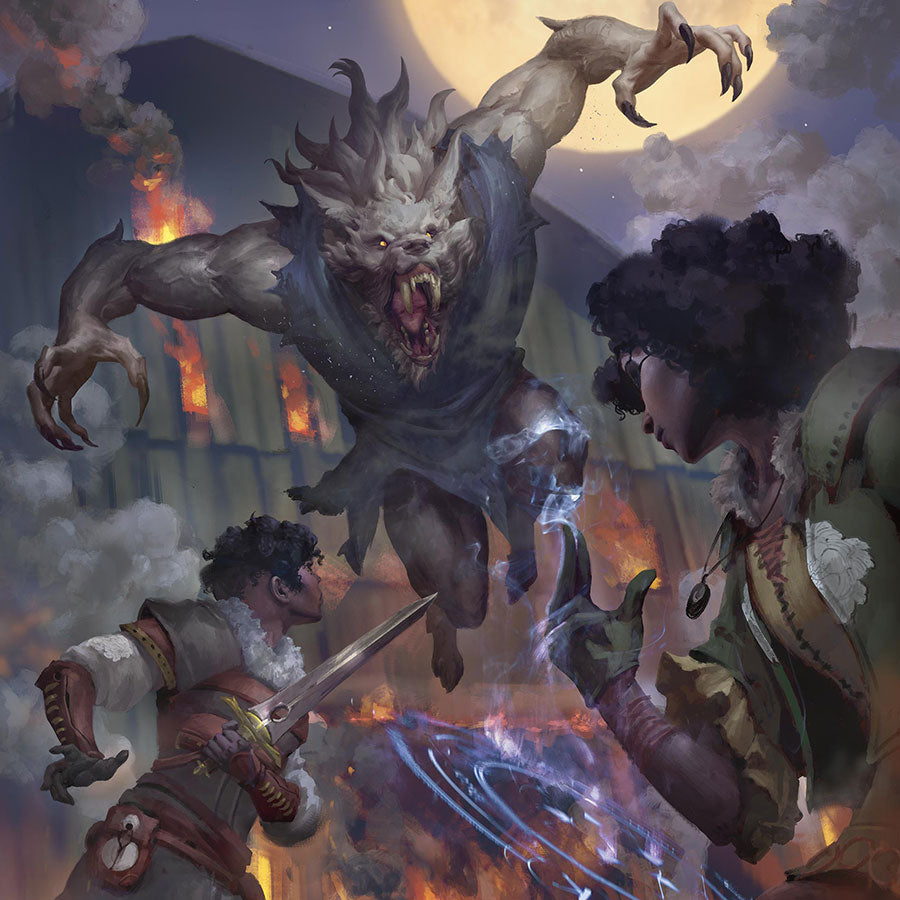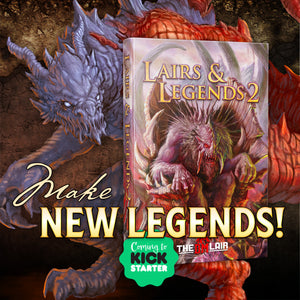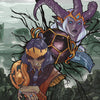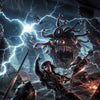The Game Master Is NOT the Storyteller

Written by Luke Hart
There is a myth floating around out there that a Game Master is a Storyteller. I was recently watching a video here on YouTube where the game master said that they dislike D&D as a game system because it doesn’t allow them to TELL THE STORY they want to tell with their RPGs.
Now, frankly, like or dislike D&D, I don’t care. I’m personally beginning to fall in love with Pathfinder 2e, and I’ve had amazing fun with Call of Cthulhu, Hackmaster, Shadowrun, Cyberpunk, and other RPGs.
What ruffled my feathers is that the person emphasized that as a game master they wanted to TELL A STORY. You see, a game master is not a storyteller, or at least, a GM should not strive to be a storyteller.
Watch or listen to this article by clicking the video below.
When I think of a game master as a storyteller, I’m reminded of one of the worst roleplaying games I’ve ever played in. This was a Call of Cthulhu one-shot game, and it began like many others. There were about six or so players, and we chose our characters from several pre-gens the GM had available.
The game master then began to explain the backstory and premise of the adventure to us. There was a fair amount of exposition with us players just sitting and listening to them. However, that’s to be expected for a one-shot; it sets the stage and gets things moving.
The thing is, though, that as we moved into the meat of gameplay, it didn’t change. There continued to be quite a bit of GM exposition, explaining things, providing details – and NOT at the request of a player, either. It was story beats or plot points that the GM had clearly planned out and that we were going to listen to one way or another. You see, it was part of their story.
However, it got much worse than that. In the first real scene of the adventure, aboard a ship, we were able to walk around, talk to NPCs, and do stuff…kind of…but there was no meaningful effect from our actions. Nothing for us to gain by doing anything. We were just “doing stuff” to kill game time as far as I could see; we couldn’t progress the game at all. It felt like we were just waiting – and we were.
Because then a special event happened which we had to go investigate. And there we found more GM exposition and details – all information that I’m confident we would have been given one way or another, regardless of what our characters did.
Now when the game first started, I was excited. It was clear the game master had done a ton of preparation; I mean, I was really impressed. But over the course of the first part of the game, I had unease and discontent growing within me.
And it was during this second main scene that I realized why: the game master was telling a story and we, the players, were really just observers. Our actions were meaningless. What was going to happen was going to happen because the game master had preordained it.
The game lost all meaning for me at that point. Fun dissipated. I questioned why I was even at that table. What was the point?
Okay, so what was it that that game master was doing wrong, from my point of view? In order to answer that question, let’s first examine some of the things a GM is supposed to do.
First, a GM adjudicates the games rules. They are the final arbitrator on how the rules work. Furthermore, when a character attempts to do a thing using said rules and often by rolling dice, the GM determines the outcome of the action, based on the game’s rules.
Creating and controlling the game world and the NPCs in it also lie within a game master’s purview. At some game tables players share the responsibility of world creation, but usually it’s just the GM who does that.
The game master also creates the adventures that the players’ characters go on. Now, an alternate term that I prefer to use for adventures is SITUATIONS. I like the term situation because it encapsulates the idea of setting something up, but not resolving it. Because, you see, a GM should design the premise of an adventure – for instance, a princess has kidnapped a dragon who must needs be rescued – and detail out the castle where the princess is holding the dragon captive. However, the GM does not design how the situation might be resolved, or even if it WILL be resolved. That’s up to the players’ characters and what they say and do over the course of the adventure. They might storm the castle, sneak in at night, pay a band of hobgoblins to provide a distraction while they break in through the back doors – or any number of possibilities.
The GM is also the master of descriptions – that is, it falls upon them to DESCRIBE the world around the characters: the enemies they encounter, the rooms of the castle, the effects of the spells that are cast, and so forth. The game master is in effect the character’s senses; if they don’t describe it one way or another, the players are completely unaware of it.
Now of all those things I mentioned that a game master does, there were a couple things missing from the list – things that game masters do NOT do:
First among them is controlling the players’ characters. This is a hard line that GMs cross at their own risk. I have seen players get quite upset when a GM dares control what their character says or does. The GM controlling players’s characters is one way that GMs can steal agency, as we call it, from their players.
The next thing that GMs should NOT do is determine in advance how an adventure is going to play out and end. Those details should instead be informed by what the players’ characters say and do during the adventure and by the dice.
A GM who tries to control how an adventure unfolds and resolves is cheating the players out of meaningful gameplay and stealing player agency just as much as if they were controlling their characters.
You see, if the game master has already determined what will happen, regardless of character choices, the dice, or other random factors… If the game master has pre-determined the final results regardless of what happens over the course of the game, then it’s all a sham. It’s not a game at all. Instead, it’s a pointless exercise where player choices don’t matter, rolling dice doesn’t matter, nothing matters – because the GM has already decided what will happen.
Furthermore, eventually the players will notice, just like I did during that Call of Cthulhu game. And once they notice, things will not only BE pointless, but the players will KNOW they are pointless. That realization likely won’t sit well with them, and their enjoyment of the game will probably tank.
Okay, so now I’m going to draw this all together and tell you why I hate it when game masters refer to themselves as storytellers, and why it’s not accurate at all, if we assume the veracity of the points previously established.
What a storyteller does, by definition, is tell the story, the entire story. And I know that’s sort of a Captain Obvious point, but hear me out:
In an RPG such as D&D or Shadowrun or Call of Cthulhu the STORY is told through a COMBINATION of the game master setting up the world, NPCs, and situation AND THEN through the players deciding what their characters say and do over the course of gameplay. Furthermore, the GAME SYSTEM and the rules and the dice, all play a role as well. A few bad dice roles, and the story turns out quite a bit differently, doesn’t it?
So then, you marry all of that together – and you get a story. But it is a collaborative effort: the game master, the players, the game system, and the dice. All of these determine what the story will finally be, NOT JUST THE GAME MASTER.
Therefore, since the game master DOES NOT solely determine what the story will in fact be – or at least they certainly shouldn’t – they are not, by definition, a storyteller. The game master is just ONE PIECE of that puzzle – admittedly a very important piece, but just one piece none-the-less.
100 Years of GM Experience at Your Fingertips!
Are you a NEW GAME MASTER feeling a bit overwhelmed by everything involved with running a role-playing game? Are you a VETERAN GAME MASTER looking for new tips and tricks to take your games to the next level? Look no further than the Secret Art of Game Mastery.
We at the DM Lair have distilled our CENTURY of accumulated GM experience into an easy-to-read guide of practical advice that you can immediately apply to your games! We've even included our own templates–the things that we use to prepare our ACTUAL games.
Get all three books to master your game:
- The Secret Art of Game Mastery. Contains over 100 years of GM advice distilled into an easy-to-read format. It introduces and explains the tools of the trade, scheduling, playstyle, post-game notes, getting player feedback, and more.
- The Secret Art of Preparation. Brings to your fingertips the actual templates and guides that the DM Lair team uses to prepare games, Lair Magazine, and more. Designed as a three-ring binder, it's intended for you to write directly into for your entire campaign!
- The Secret Art of Notetaking. Gives you the keys to tracking your campaign from session to session just like the DM Lair team. Designed as a three-ring binder, it's intended for you to write in and keep track of your whole campaign!
With so much knowledge and experience on its pages, The Secret Art of Game Mastery is guaranteed to become an indispensable tool for all game masters, new and veteran alike. And if that isn’t enough, the information applies to all game systems and all genres!
-
Posted in
Game Master How-To Articles







